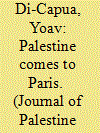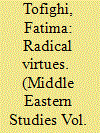|
|
|
Sort Order |
|
|
|
Items / Page
|
|
|
|
|
|
|
| Srl | Item |
| 1 |
ID:
178331


|
|
|
|
|
| Summary/Abstract |
In the early 1960s, Israeli diplomats based in Paris noted that student life there had become political in new ways that threatened to undermine Israel’s image and standing in the public mind. In an effort to understand the growing international student body and its nine thousand well-integrated Arab students, the embassy asked Israeli students to spy on their colleagues and submit detailed reports about their political associations, thoughts, opinions, connections, whereabouts, and much else. Using the reports and other auxiliary material that the Israeli diplomats collected, this article examines the formation process of a unique, student-led intellectual and political ecosystem. Specifically, it shows how, in tandem with the rise of the New Arab Left and other transnational student collaborations, the Palestinian question grew from a marginal and marginalized issue to a major cause that was deeply entwined with other contemporaneous causes of universal resonance, such as those of South Africa, Rhodesia, and Algeria.
|
|
|
|
|
|
|
|
|
|
|
|
|
|
|
|
| 2 |
ID:
188228


|
|
|
|
|
| Summary/Abstract |
This article maps the internationalization of the Palestinian cause by studying the participants, groups, and themes at Palestinian solidarity conferences held in 1969–70. Examining such conferences reveals the extent of communication and ideological debate between the Palestine Liberation Organization (PLO) and international solidarity activists at an important juncture in the internationalization of the Palestinian liberation movement. The article makes the methodological point that international conferences organized by the PLO and other Palestinian institutions can function as an alternative archive that complements the traditional archives of diplomatic and intellectual history. Read in tandem with extant Palestinian sources, the paper trail left by international conferences mitigates the scattered and precarious status of Palestinian archives.
|
|
|
|
|
|
|
|
|
|
|
|
|
|
|
|
| 3 |
ID:
183755


|
|
|
|
|
| Summary/Abstract |
Disillusioned by possibilities of political reform in an economically developing country, the Irani-an radicals of the 1960s and 70s adopted certain practices. These bodily techniques served both practical concerns and radical self-fashionings. That is, the guerrilla fighters had to familiarize themselves with mountains and forests, recruit members from the working class, and subsist on minimal means in communal houses. But they also would not succumb to the newly-emerging comprador bourgeois values that was, in their opinion, feeding imperialism. In this article I study those bodily practices in their global context, by reference to the practical and theoretical back-ground. It is interesting that while the paramilitary or theoretical aspects of these movements were not always appealing to the larger society, the bodily ethics could intrigue people from across the political or religious spectrum. The particular virtues of self-sacrifice, resilience, self-reliance, seriousness, among other things were cultivated by means of bodily practices. By these kinds of bodily resistance, Iranian radicals formed a subjectivity outside the dominant/dominated binary, where increasing political consciousness involved lifestyle changes on the most private surface.
|
|
|
|
|
|
|
|
|
|
|
|
|
|
|
|
|
|
|
|
|